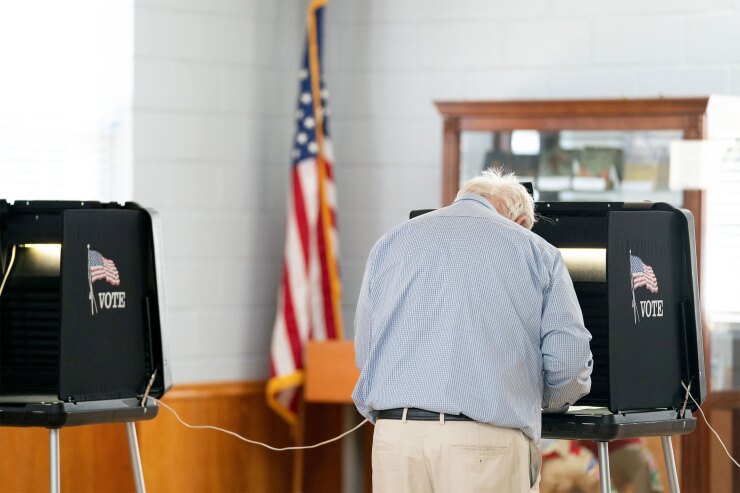Next Tuesday's off-year election is likely to see far lower turnout at the polls than during last November's presidential contest, but voters will nevertheless be asked to weigh in on ballot referendums and questions concerning an estimated total of $3.1 billion in potential tax hikes in 20 states, according to a
The NTU noted that in total, voters will cast ballots on 13 statewide measures and 911 local measures ranging from higher property and sales taxes to new local levies and bond issuances.
"These ballot measures may not generate the same headlines as political races, but they have a far more lasting effect on taxpayers' finances," Tommy Aiello, senior director of government affairs at the National Taxpayers Union, said in a statement. "Voters deserve clear, accessible information about what they're being asked to fund, and how much it will cost."
Of the estimated $3.1 billion in new taxes:
- $1.7 billion comes from higher property tax rates;
- $1.3 billion from higher sales tax rates; and,
- Millions more from other tax sources.
Along with tax increases, voters will also weigh in on $37.3 billion in new bond issuances, imposing long-term obligations on taxpayers for decades to come.
State-level highlights
- California: Voters won't decide on any statewide ballot measures with a direct tax or fiscal impact, but 13 local measures will appear across nine counties. The total net statewide revenue collections on the ballot would amount to at least $393 million in annual tax increases or extensions. Voters in Santa Cruz County will consider whether to impose an annual tax of $50 per parcel and a real estate transfer tax of 0.5% on properties sold above $4 million to fund "climate resistance." It would be a tax increase of approximately $1.1 million annually for 10 years.
- Colorado: Voters will decide on two statewide ballot measures related to funding for the "Healthy Meals For All" school meal program. In addition, 99 local measures will appear on the ballot across 30 counties. The total net statewide revenue collections on the ballot, including state and local measures, would amount to at least $583 million in annual tax increases or extensions. Voters will also be asked about the issuance of $1.1 billion in bonds. Voters in Telluride will consider whether to impose a 5% excise tax on ski lift tickets to fund local infrastructure improvements.
- Texas: Voters in the Lone Star State will decide on 10 statewide ballot measures that directly impact their tax rates, and will also be asked about 264 local measures across 55 counties. After analyzing these measures, the NTU has found that the total net statewide revenue collections on the ballot would amount to at least $280.7 million in annual tax increases or extensions. The NTU also calculates there to be approximately $26.6 billion in bond measures across the state. Voters in Bexar County will consider a question to increase the county's lodging tax to 2% and car rental tax to 5% to fund the local coliseum complex venture project. A separate question on the ballot will authorize use of that same revenue to construct a new arena for the San Antonio Spurs. This would amount to a permanent tax increase of $16.7 million annually.
- Michigan: Voters won't decide on any statewide ballot measures with a direct tax or fiscal impact this year, but will be asked about 153 local measures across 43 counties. The total net statewide revenue collections on the ballot would amount to at least $235.2 million in annual tax increases or extensions. The NTU also calculates there to be approximately $3.6 billion in bond measures across the state. Voters in Grout Township will consider whether to allow the town to raise the property tax levy for mosquito abatement. It represents a tax increase of $58,000 annually for two years. Voters in Lowell Charter Township, meanwhile, will consider whether to renew the property tax levy, with an increase to $2.20 per $1,000 in assessed value for moth suppression. The measure represents a tax increase of $184,000 annually for three years.
The NTU team couldn't obtain fiscal data for 562 measures due to inconsistent or incomplete reporting across localities. The report also encountered obstacles in states such as Arizona, where new campaign-finance laws are so broad that they threaten to restrict nonpartisan voter education efforts. Ohio was not included in the report because of the sheer volume of taxing authorities.






